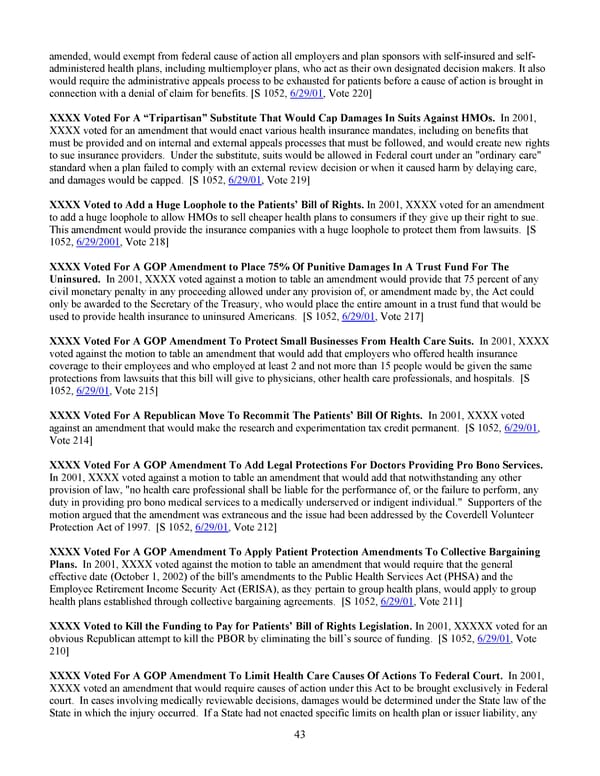amended, would exempt from federal cause of action all employers and plan sponsors with self-insured and self- administered health plans, including multiemployer plans, who act as their own designated decision makers. It also would require the administrative appeals process to be exhausted for patients before a cause of action is brought in connection with a denial of claim for benefits. [S 1052, 6/29/01, Vote 220] XXXX Voted For A “Tripartisan” Substitute That Would Cap Damages In Suits Against HMOs. In 2001, XXXX voted for an amendment that would enact various health insurance mandates, including on benefits that must be provided and on internal and external appeals processes that must be followed, and would create new rights to sue insurance providers. Under the substitute, suits would be allowed in Federal court under an "ordinary care" standard when a plan failed to comply with an external review decision or when it caused harm by delaying care, and damages would be capped. [S 1052, 6/29/01, Vote 219] XXXX Voted to Add a Huge Loophole to the Patients’ Bill of Rights. In 2001, XXXX voted for an amendment to add a huge loophole to allow HMOs to sell cheaper health plans to consumers if they give up their right to sue. This amendment would provide the insurance companies with a huge loophole to protect them from lawsuits. [S 1052, 6/29/2001, Vote 218] XXXX Voted For A GOP Amendment to Place 75% Of Punitive Damages In A Trust Fund For The Uninsured. In 2001, XXXX voted against a motion to table an amendment would provide that 75 percent of any civil monetary penalty in any proceeding allowed under any provision of, or amendment made by, the Act could only be awarded to the Secretary of the Treasury, who would place the entire amount in a trust fund that would be used to provide health insurance to uninsured Americans. [S 1052, 6/29/01, Vote 217] XXXX Voted For A GOP Amendment To Protect Small Businesses From Health Care Suits. In 2001, XXXX voted against the motion to table an amendment that would add that employers who offered health insurance coverage to their employees and who employed at least 2 and not more than 15 people would be given the same protections from lawsuits that this bill will give to physicians, other health care professionals, and hospitals. [S 1052, 6/29/01, Vote 215] XXXX Voted For A Republican Move To Recommit The Patients’ Bill Of Rights. In 2001, XXXX voted against an amendment that would make the research and experimentation tax credit permanent. [S 1052, 6/29/01, Vote 214] XXXX Voted For A GOP Amendment To Add Legal Protections For Doctors Providing Pro Bono Services. In 2001, XXXX voted against a motion to table an amendment that would add that notwithstanding any other provision of law, "no health care professional shall be liable for the performance of, or the failure to perform, any duty in providing pro bono medical services to a medically underserved or indigent individual." Supporters of the motion argued that the amendment was extraneous and the issue had been addressed by the Coverdell Volunteer Protection Act of 1997. [S 1052, 6/29/01, Vote 212] XXXX Voted For A GOP Amendment To Apply Patient Protection Amendments To Collective Bargaining Plans. In 2001, XXXX voted against the motion to table an amendment that would require that the general effective date (October 1, 2002) of the bill's amendments to the Public Health Services Act (PHSA) and the Employee Retirement Income Security Act (ERISA), as they pertain to group health plans, would apply to group health plans established through collective bargaining agreements. [S 1052, 6/29/01, Vote 211] XXXX Voted to Kill the Funding to Pay for Patients’ Bill of Rights Legislation. In 2001, XXXXX voted for an obvious Republican attempt to kill the PBOR by eliminating the bill’s source of funding. [S 1052, 6/29/01, Vote 210] XXXX Voted For A GOP Amendment To Limit Health Care Causes Of Actions To Federal Court. In 2001, XXXX voted an amendment that would require causes of action under this Act to be brought exclusively in Federal court. In cases involving medically reviewable decisions, damages would be determined under the State law of the State in which the injury occurred. If a State had not enacted specific limits on health plan or issuer liability, any 43
 HRC vote skeleton Page 49 Page 51
HRC vote skeleton Page 49 Page 51